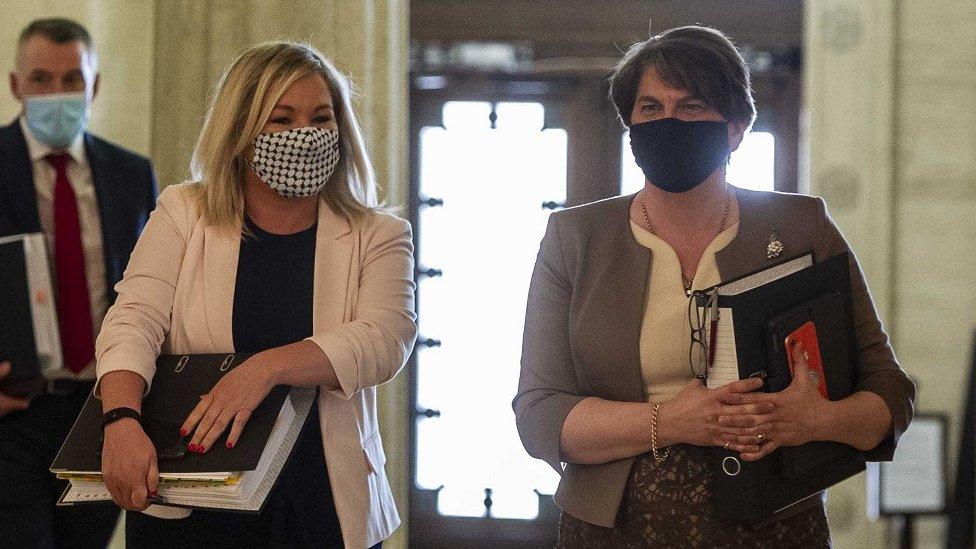Arlene Foster urges NI parties to stick to language deal
- Published
Arlene Foster makes her final speech to the Northern Ireland Assembly as first minister
Arlene Foster has urged Northern Ireland's political parties to stick to a language and cultural deal they agreed to in January 2020.
Speaking in the Stormont assembly ahead of her resignation as first minister on Monday, Mrs Foster said the deal was "the only model for success".
Sinn Féin leader Mary Lou McDonald said the UK government had to move a law on Irish language through Westminster.
The issue has long been a sticking point for Stormont's political parties.
Mrs Foster's departure as first minister came six weeks after she was ousted as Democratic Unionist Party (DUP) leader.
In her statement to the assembly, she also said she would continue to speak up for women in public life.
When Mrs Foster resigned, Sinn Féin's Michelle O'Neill also lost her position as deputy first minister because the roles are a joint office.
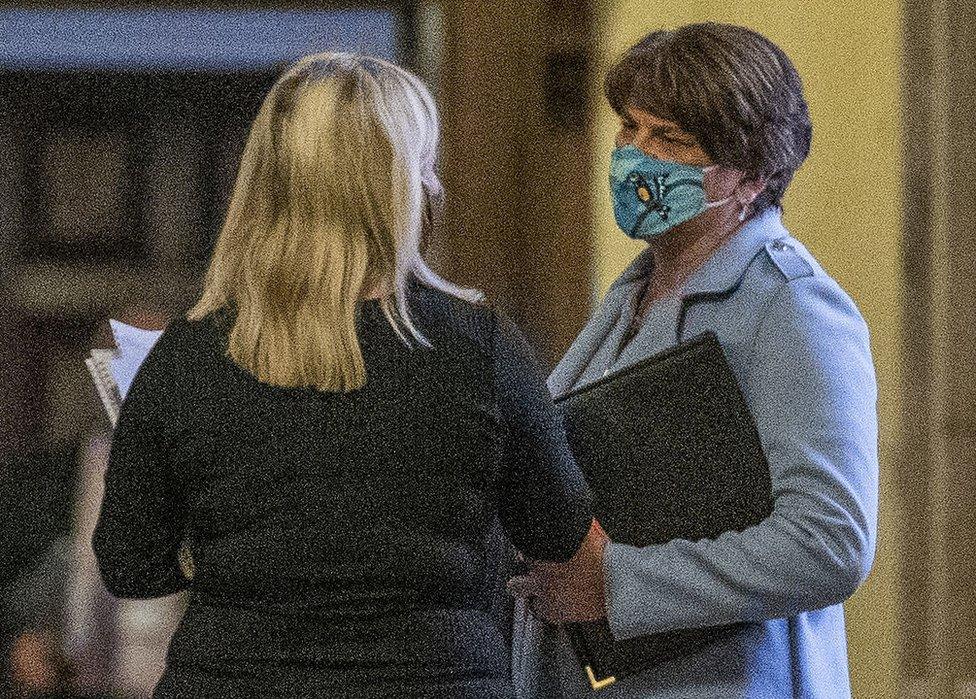
Arlene Foster spoke to Michelle O'Neill shortly before she delivered her resignation speech at Stormont
There is now a seven-day period for the approval of a new first minister and deputy first minister by the DUP and Sinn Féin.
Sinn Féin has suggested it may not support a new DUP first minister unless legislation on the Irish language is approved by ministers before 10 July.
Mrs Foster said parties should support the deal on culture - which included language legislation - in the New Decade, New Approach deal, which restored devolution to Northern Ireland in January 2020.
She said: "My team and I sought and secured a cultural package that would see a range of measures to advance identities and protect them for future generations.
"This is the only model for success - not one step forward for some and one step back for others."
The deal included an Office of Identity and Cultural Expression, an Irish language commissioner and a commissioner to enhance and develop the language and culture of the Ulster-Scots/Ulster-British tradition.
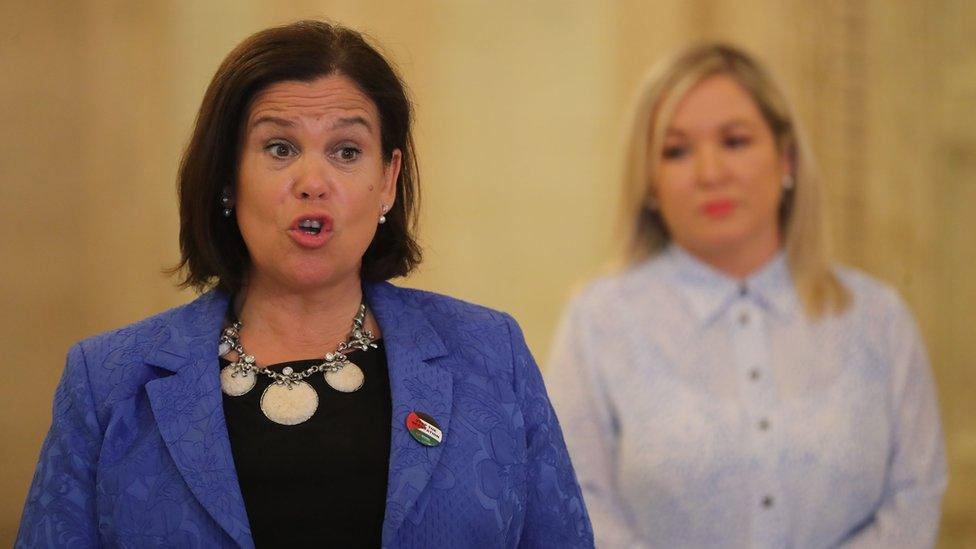
Mary Lou McDonald says the UK and Irish governments should intervene in the row over Irish language legislation
On Monday morning Edwin Poots, who replaced Mrs Foster as DUP leader last month, said he intended to support Irish language legislation but not necessarily before the next assembly election in May 2022.
Speaking after a Sinn Féin meeting with the UK government on Monday evening, Ms McDonald said her party would have preferred the legislation to be delivered through the Stormont as agreed.
She said Sinn Féin had "engaged intensively" with Mr Poots and his party.
"He has told us that they will not be delivering [the legislation] during the existing assembly mandate," she said.
"It is now incumbent on the British and Irish governments to act."
'I will contribute'
Speaking in the assembly, Mrs Foster said she would now spend more time with her family "whether they like it or not".
"It's just as well, Mr Speaker, I am such a good daughter, wife and mother," she added, in an apparent reference to Mr Poots' statement in 2016 when Mrs Foster became first minister that her "most important job" remained "that of a wife, mother and daughter".
Mrs Foster said she had unfinished business to ensure Northern Ireland succeeded in its new century.
Arlene Foster: "It is only by respecting each other's identity that we will move forward."
"I will contribute in whatever way I can to see Northern Ireland advance politically, socially, economically and culturally as part of the UK," she said.
"Strong, functioning devolution is vital to this."
She also called for changes to the Northern Ireland Protocol - the part of the Brexit deal which keeps Northern Ireland within the EU single market for goods - which she said had thrown relations between the UK and Ireland and the UK and EU "out of balance".
She said: "If Brussels continues to think the protocol is enough, they are in denial.
"Imbalance and instability in the context of Northern Ireland is a truly dangerous cocktail.
"Northern Ireland is part of the United Kingdom and needs to be treated as such."


She didn't sing this time but she used a joke comparing her final speech to Father Ted Crilly's at the Golden Clerics.
It wasn't that - for a start there were very few barbs, although Edwin Poots was probably the target when she talked about being a better wife and mother.
On the issue which now threatens the existence of devolution - language - she praised the cultural package in the New Decade, New Approach Agreement, saying a step forward for one was a step backwards for others.
And she took a final swipe at the Northern Ireland Protocol saying "Northern Ireland is part of the UK and needs to be treated as such", accusing Brussels of being in denial.
But that is now a problem for others.
Mrs Foster, however, says she has "unfinished business", whatever that will be.

Mrs Foster served as first minister from January 2016 to January 2017 - when the Northern Ireland Assembly collapsed - and again from January 2020.
She stood down as DUP leader after an internal party revolt, with at least 22 assembly members (MLAs) and four MPs signing a letter of no confidence.
Her departure prompted a series of resignations within the DUP, with several councillors and party members expressing their anger about how she was ousted.
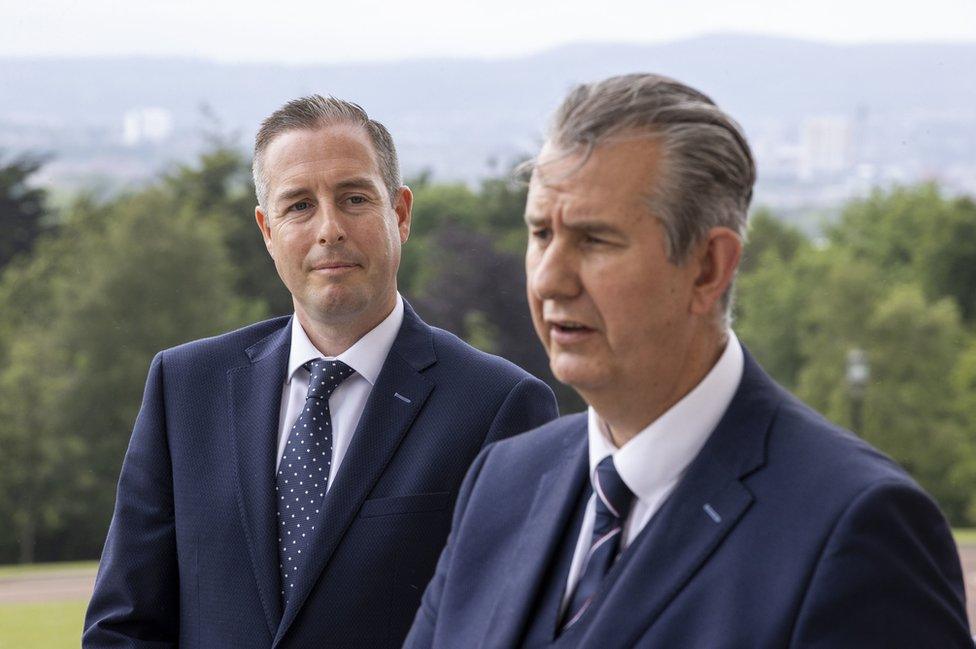
Paul Givan (left) - pictured with DUP leader Edwin Poots - is the party's nomination for first minister
Speaking last week, Mrs Foster said she was sad about the manner of her departure, but was "looking forward" to new possibilities.
A sitting of the assembly to nominate a new first minister and deputy first minister could take place next Monday.
Mr Poots has said he will nominate his party colleague Paul Givan to become the new first minister.
Sinn Féin must nominate a candidate for deputy first minister or a first minister is unable to take office.
If the DUP and Sinn Féin fail to nominate first and deputy first ministers, the Northern Ireland secretary is obliged to call an election within a reasonable time.
SDLP leader Colum Eastwood said he feared that if the Stormont institutions collapsed they would not come back.
He said "grown up" politicians "make a commitment and get it done".
"They don't threaten the whole edifice of government just because they don't get their own way," he said.

Colum Eastwood wants the DUP and Sinn Féin to sort out their differences on language legislation
Ulster Unionist leader Doug Beattie said the deadlock over language laws was a "serious situation where our institutions could fall and our people could suffer".
He called on Sinn Féin and the DUP to "put the people first and come up with an agreement".
The DUP's other new ministers affirmed the pledge of office and took up their posts on Monday afternoon.
Michelle McIlveen replaced Peter Weir as education minister while Paul Frew took over from Diane Dodds as economy minister.
Northern Ireland Secretary Brandon Lewis said it was essential that the transition to new leadership was "as smooth as possible".
"The people of Northern Ireland need strong political leadership," he said.
- Published13 June 2021
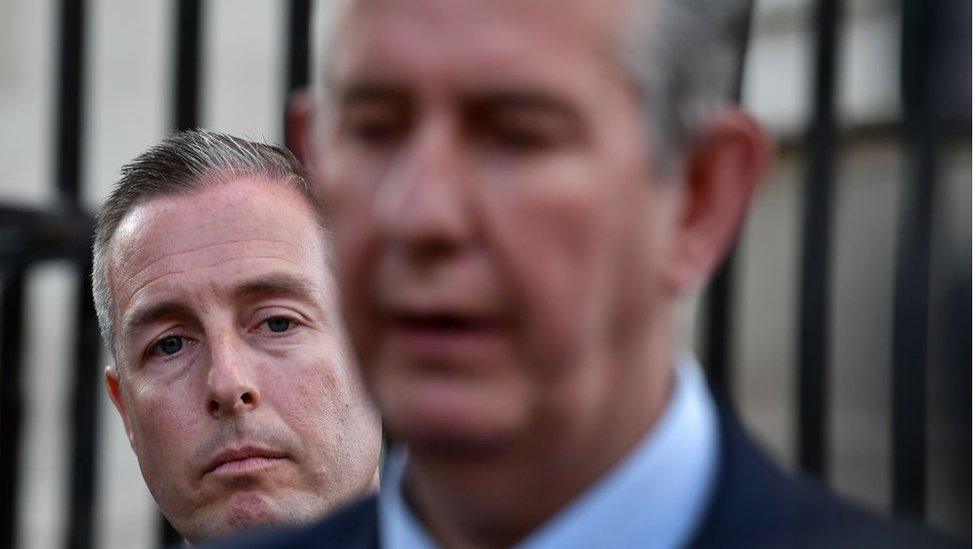
- Published13 June 2021
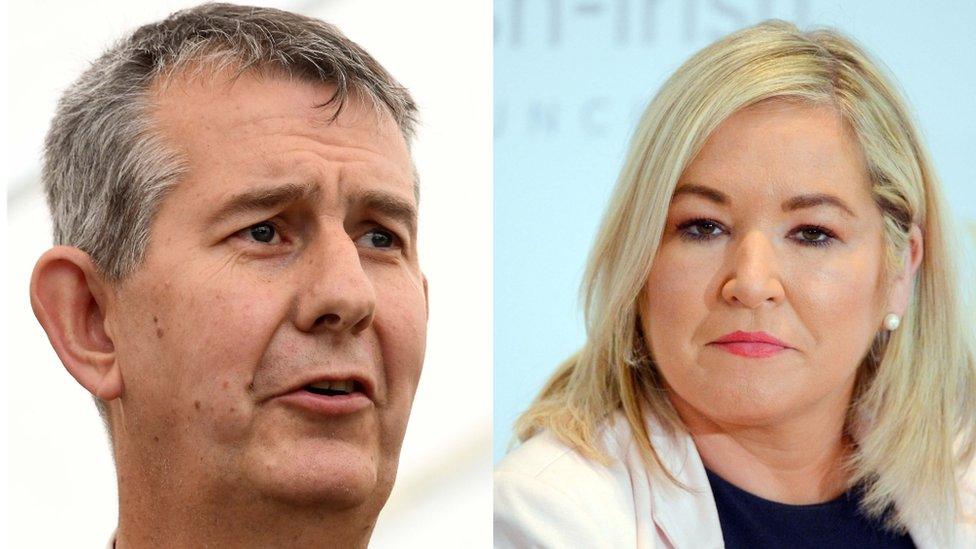
- Published14 June 2021
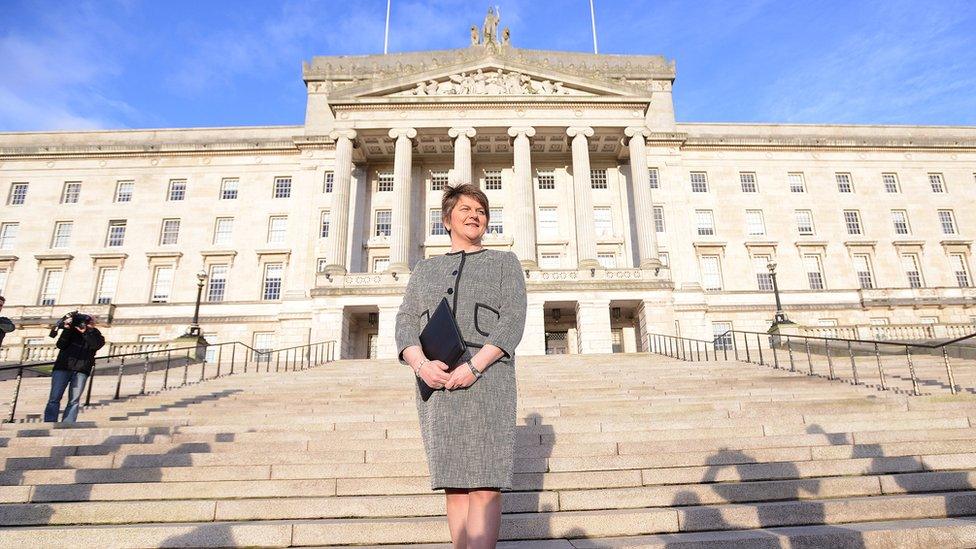
- Published14 June 2021
